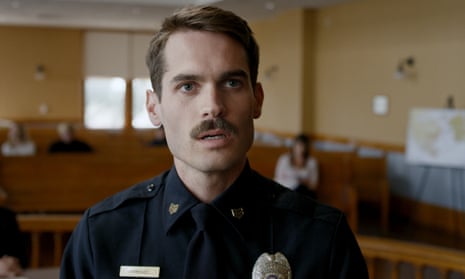At the Sundance film festival in January 2016, multitasking force-of-nature Jim Cummings unveiled a brilliantly excruciating short about a bereaved cop struggling to say goodbye to his mother at her funeral. Inspired by his mum’s love of dance and Bruce Springsteen, Cummings’s hapless Officer Jim Arnaud expresses his grief through the medium of movement and song. It’s a jaw-dropping slice of tragicomic despair, a spectacle made all the more toe-curling by being captured in a single unforgiving 12-minute shot. “We have no idea who you are,” said Sundance judge Keegan-Michael Key presenting the grand jury prize for short film to “real discovery” Cummings, “but this film is like a Gesamtkunstwerk, a mini-masterpiece of writing, directing and acting.”
Consolidating his Sundance success, New Orleans-raised Cummings (who had in fact worked in film for years, producing “things that didn’t really connect with audiences”) used Kickstarter to help fund a feature version of Thunder Road, which won a grand jury award at SXSW last year. Since then, this shoestring budget indie-pic (it was made for just $190,000, on a 15-day shoot) has won plaudits from festival audiences and critics alike, with Rolling Stone’s David Fear quotably declaring: “I have seen humanistic American film-making’s future, and its name is Jim Cummings.”
The feature opens with a reimagined – and arguably even more painful – version of the short film, a funereal curtain-raiser to a full-length squirm-fest filled with wince-inducing gallows humour. Once again, poor Jim is captured in horrifically uncut footage, haplessly performing in front of his mother’s coffin. This time, however, the pink kiddies’ beatbox he’s brought to play the Boss’s music simply refuses to play ball, leaving Jim to flail silently before his audience of stunned mourners, who don’t know whether to laugh, cry or scream. The film’s audience feels much the same way.
Having impressively upped the ante on its short-film roots, Thunder Road then faces the daunting task of stretching that queasily hilarious air of distressing character comedy over the course of a 90-minute movie. That it doesn’t quite manage to do so is hardly surprising. While a film-maker such as Jennifer Kent, for example, may have built upon her creepily experimental Monster in the 2014 hit The Babadook, many genuinely arresting shorts have a natural rhythm that doesn’t transfer easily to the feature format. Notable, too, that Cummings has cited The Office’s David Brent and Steve Coogan’s Alan Partridge as influences on his Arnaud character, both of whom have appeared in features, yet significantly found their perfect medium in episodic TV or streaming series (a format in which Cummings has also honed his art).
What we have instead is a succession of variously successful vignettes, only some of which hit that sweet spot between horror and humour, as we watch Arnaud’s life collapse around him. At home, he struggles to connect with his young daughter, Crystal (Kendal Farr), whose mum, Rosalind (Jocelyn DeBoer), is in the process of screwing him in divorce proceedings. At work, his captain wants him to take some time off, clearly aware of his fragile mental state. Only friend and colleague Nate (a very engaging turn from Nican Robinson) really has his back, but Arnaud’s outlook is so pathologically introverted that even acts of kindness are met with a passive-aggressive form of self-loathing hostility.
A scene with Crystal’s teacher (the terrific Macon Blair) cuts to the core of the matter – that Jim, who winds up threatening to trash the classroom, makes everything about him. There’s a chilling touch of 70s-era Paul Schrader in Cummings’s evocation of a man on the edge, not least when Arnaud tears off his uniform while railing against the police force that he believes has betrayed him.
Occasionally the film itself suffers from a similar solipsism, although perhaps that’s to be expected from a movie that is “written, directed and performed by” its one-man-show-maker (Cummings also gets music and editing credits). Yet there are times when Thunder Road comes perilously close to embracing Arnaud’s aggrieved worldview, particularly in relation to his marriage, which forms the narrative’s most dubious (and clumsily contrived) thread.
In its finer moments, however, Thunder Road evokes a sense of pathos that approaches profundity. There’s real beauty in its evocation of all-too-human awkwardness, embodied in Cummings’s grimaced expression that seems to waver between a smile and a sob. We see it first at the funeral, and last in the film’s theatrical final shot, capturing that blend of tragedy and comedy that so often proves elusive. Cummings’s feature debut doesn’t always get the balance right, but when it does it packs a bittersweet punch.

Comments (…)
Sign in or create your Guardian account to join the discussion